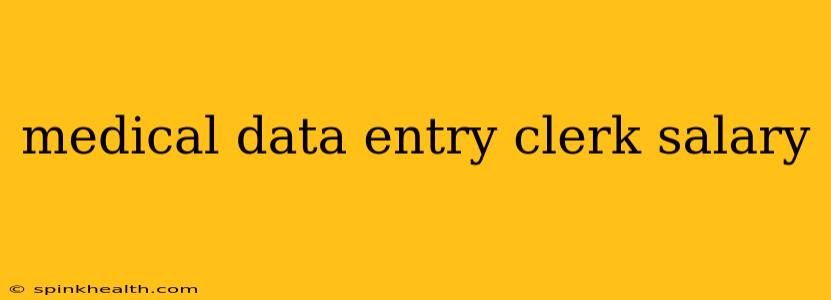Decoding the Dollars: A Deep Dive into Medical Data Entry Clerk Salaries
The rhythmic tap-tap-tap of keys, the quiet hum of the computer – this is the soundtrack of a medical data entry clerk's day. Behind the scenes, these professionals are vital cogs in the healthcare machine, ensuring patient records are accurate, complete, and readily available. But what does this crucial role pay? Let's unravel the complexities of medical data entry clerk salaries and explore the factors that influence earnings.
My name is Sarah, and I've spent the last five years researching and writing about healthcare careers. I've interviewed countless professionals, including medical data entry clerks, to understand the realities of their work and compensation. This isn't just a data dump; it's a story, built from real-world experience and insights.
What is the average salary for a medical data entry clerk?
The average salary for a medical data entry clerk in the United States hovers around $35,000 to $45,000 annually. However, this is a broad average, and the actual salary can vary significantly depending on several factors. Think of it like this: a single average doesn't capture the diverse landscape of a bustling city.
What factors influence a medical data entry clerk's salary?
Several factors play a crucial role in determining a medical data entry clerk's compensation package. Let's delve into some key influences:
Location: Just like the cost of living varies dramatically across the country, so do salaries. Major metropolitan areas with a higher cost of living often command higher salaries compared to smaller towns or rural areas. A clerk in New York City might earn considerably more than their counterpart in rural Iowa. This is a critical factor to consider when researching potential job opportunities.
Experience: Entry-level positions typically start at the lower end of the salary range. As experience grows, so does earning potential. Someone with five years of experience under their belt can expect a significantly higher salary than a fresh graduate. Skills honed through time, such as proficiency in specific software or a deeper understanding of medical terminology, become valuable assets.
Employer Type: The type of employer can also impact salary. Large hospitals or healthcare systems might offer more competitive salaries and benefits packages compared to smaller clinics or private practices. Government agencies may offer benefits packages that can influence the overall compensation even if the base salary is lower.
Education and Certifications: While a high school diploma or GED is often sufficient, additional education or certifications, such as a medical billing and coding certificate, can significantly boost earning potential. These credentials demonstrate a higher level of expertise and commitment to the profession, often leading to higher-paying opportunities.
Does experience significantly impact a medical data entry clerk's salary?
Yes, absolutely. Experience plays a major role. A medical data entry clerk with several years of experience under their belt will have a deeper understanding of medical terminology, faster typing speeds, and a proven ability to maintain accuracy. All these factors make them more valuable to employers, hence, the higher salary.
What are the benefits of working as a medical data entry clerk?
Beyond the salary, this career often offers valuable benefits. Many employers provide health insurance, paid time off, and retirement plans. These benefits significantly enhance the overall compensation package, making it more attractive to potential employees.
What skills are essential for a successful medical data entry clerk?
This job requires accuracy and attention to detail above all else. Data entry is not simply about speed; it's about meticulousness. Other crucial skills include:
- Typing proficiency: Fast and accurate typing is essential.
- Medical terminology: A solid understanding of medical terms, abbreviations, and codes is critical.
- Data entry software proficiency: Familiarity with various software packages used in healthcare data entry.
- Attention to detail: Accuracy is paramount to avoid errors that could have serious consequences.
- Organizational skills: Keeping track of multiple patient files and ensuring their accuracy requires strong organizational skills.
The life of a medical data entry clerk isn't just about numbers on a screen; it's about contributing to the smooth functioning of the healthcare system. While the salary is a significant factor, the impact on patient care, the steady employment opportunities, and the potential for growth within the healthcare industry make this a career worth considering. Remember, this is a constantly evolving field, so stay updated with the latest technologies and industry trends to maximize your earning potential.

